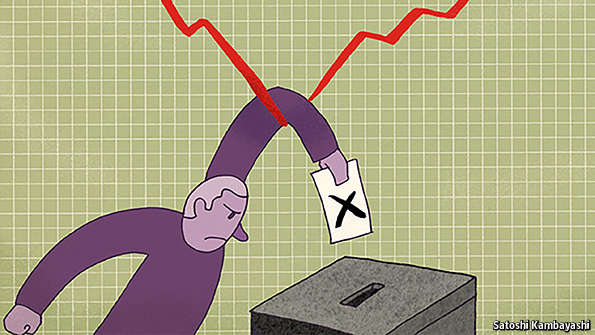Welcome to the Epsom College Economics and Enterprise Society blog. This site contains the musings of the army of students and staff interested in all matters relating to our subjects.
Disclaimer: the views expressed on this site are those of the contributors and not of Epsom College.
Sunday, 8 March 2015
The limitations of voters in choosing economic policies
The decision about whether to modify Greece's bail-out has sparked claims about a lack of democracy. It is said that Greece's creditors are overriding the electoral mandate of the Syriza party.
In reality, voters have always faced constraints on their freedom to choose the economic policies they want. They have a limited ability to pursue redistribution of income by taxing the minority i.e. high income earners because there is a point at which higher taxes lead to lower revenues as effort is discouraged. We do not know the point at which this occurs but considering how we are now living in an era of mobile people and firms, the threshold might be lower than it used to be. Furthermore, when countries rely on international creditors for finance, they have no control over the terms on which they borrow and they cannot coerce creditors to roll over their debts. Although there is nothing stopping countries from defaulting on their debts, in the short-term default would probably lead to budgetary restrictions. Voters may end up with austerity after all.
As electorates evolved over time, economic regimes followed suit. The Depression in 1945 resulted in most governments implementing Keynesian demand management by allowing deficits to grow to avoid recession. However, the policy stopped working in the mid-1970s because of simultaneous high inflation and unemployment, also known as stagflation. The policy regime was blamed because politicians decided to set interest rates to gain electoral advantage and this caused inflation to rise. After that, central banks started controlling economic policy by using interest rates to manage the cycle. They soon became unpopular when inflation was being squeezed out of the system in the late 1970s and early 1980s. This changed when inflation declined and interest rates fell and were thought of as the 'great moderation' of low inflation and steady economic growth.
This shift was a clear deviation from democratic control of economic policy. Even though governments still dictate the mandate of the central banks and appoint the people in charge, voters who disagree with the policies of Janet Yellen and Mario Draghi (the two most prominent economic decision makers in America and Europe) cannot get rid of them. The importance of central bankers has been reinforced after the financial crisis in 2009. During that time, most politicians were not willing and able to provide fiscal stimulus. On the other hand, central banks could both deliver monetary stimulus and buy government bonds through quantitative easing (QE), which made it easier to finance deficits. Also, it appeared to run smoothly because hyperinflation was avoided, going against predictions.
However, those in Europe who voted for the single currency do not have a local central bank. The European Central Bank has only just started QE and of course, such countries have not devalued their currencies as they were unable to (a move that put Iceland on the road to recovery). Critics claimed that the single currency should not have been created without political or fiscal union. Greeks may not like the European superstate that could easily make big fiscal transfers. They might be just as powerless as how they are when negotiating with their creditors. The weight that Greece has in a euro-zone electorate is very small.
This leads on to an even bigger problem. Politicians gain power on the basis of their economic promises to their domestic electorates. But the deciding factor of whether their economies will prosper is the state of global economies, not local e.g. whether China's economy will do well or what the oil prices are like, etc. National politicians will still take the blame for the effects of those things despite it being out of their control. This will further strengthen the cynicism of voters about politics and damage the support for democracy.
Subscribe to:
Post Comments (Atom)

No comments:
Post a Comment